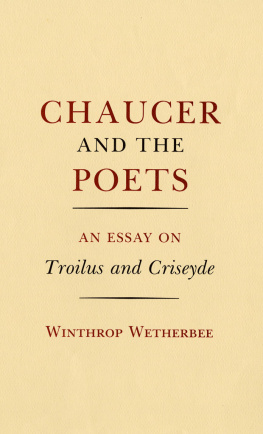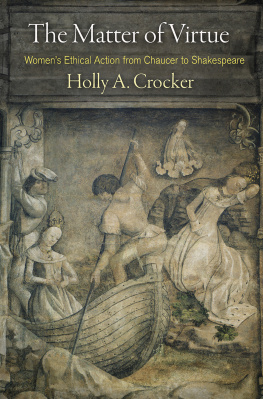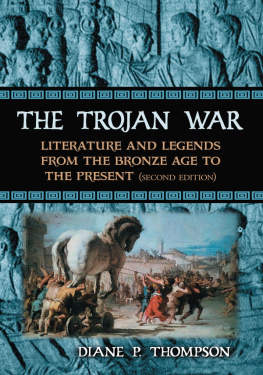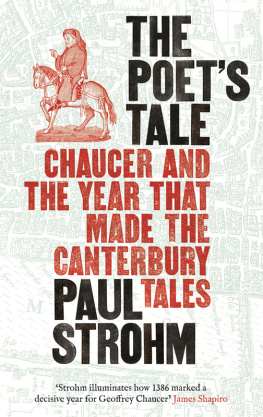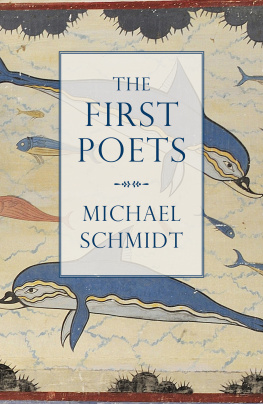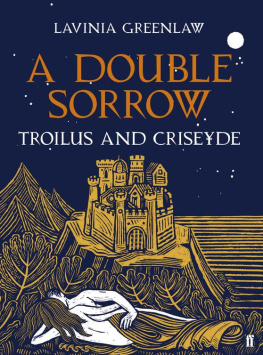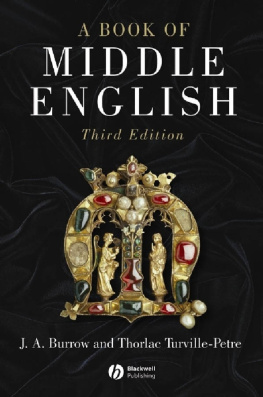A Note on Texts
All quotations from the Troilus are from the edition of R. K. Root, The Book of Troilus and Criseyde (Princeton University Press, Princeton, N.J., 1926). For Vergil I have used the Oxford Classical Texts edition of R. A. B. Mynors (Oxford University Press, Oxford, 1969); for Ovid, the Bud edition of the Metamorphoses, ed. Georges Lafaye, 3 vols. (Les Belles Lettres, Paris, 192830); for Statius, the Teubner edition of the Thebaid, ed. Alfred Klotz, rev. Thomas C. Klinnert (Teubner Leipzig, 1973); for the Roman de la Rose, the Classiques franais du moyen ge edition of Flix Lecoy, 3 vols. (Champion, Paris, 196570); for Dantes Commedia, the edition of Charles S. Singleton, 6 vols. (Princeton University Press, Princeton, N.J., 197075); for Boccaccio, the Scrittori dItalia edition of the Filostrato, ed. Vincenzo Pernicone (Scrittori dItalia Bari, 1937). Translations are my own, except those from the Commedia, for which I have used the version of Singleton, and those from the Filostrato, most of which are taken from N. R. Havely, Chaucers Boccaccio (D. S. Brewer, Woodbridge, Suffolk, 1980).
W. W.
[1]
The Narrator, Troilus, and the Poetic Agenda
T he importance of the classical tradition for the Troilus and the complexity of the poets engagement with that tradition are evident from the opening lines of the poem. The narrator begins with a solemn and sweeping statement of his theme, defining the noble status of his hero and the outlines of his tragedy:
The double sorwe of Troilus to tellen,
That was the kyng Priamus sone of Troye,
In lovynge how his aventures fellen
Fro wo to wele, and after out of joie,
My purpos is, or that I parte fro ye.
[1. 15]
It is hard to know to what extent or in what sense Chaucer intended his opening lines to recall the opening of a classical epic. Their sheer sonority and the sureness and economy with which they trace the arc of Troiluss experience are impressive; but their very comprehensiveness tends to call attention to the shape of the story and its implicit moral, rather than set off any heroic attribute of Troilus himself. Moreover, a number of details conspire to offset whatever impression of epic grandeur the lines may seem to convey. The poet can hardly be said to leap in medias res, and indeed his opening is not far from the Fortunam
Whatever solemnity the opening of the poem manages to attain is further disrupted by the lines that follow the initial overview. All this I intend to tell, the narrator declares, or that I parte fro ye. In this abrupt shift from the statement of high purpose to a direct address to his audience we are given a first hint of what we will come to see as the narrators characteristic uneasiness with the weighty responsibilities of serious poetry, his need to descend from time to time and speak as a mere man in But after appealing to us with this touch of domesticating humility, the narrator shifts again, even more abruptly than before:
Thesiphone, thow help me for tendite
Thise woful vers, that wepen as I write.
[1. 67]
The summoning of the Fury stands in jarring contrast to the human bond that the poet had established with his hearers in the previous line. In the wake of its disorienting effect, the poets weeping verses seem similarly dislocated, not simply a projection of his own emotion like Boccaccios verso lagrimoso (Fil. 1. 6), but as if charged with an energy of their own.
Shocking and puzzling in itself, the appeal to Tisiphone assumes an added complexity if we hear in it an allusion to the one precedent for it that earlier poetry provides. Again the allusion invokes Statiuss Thebaid, this time directly: when Chaucers narrator, in the derknesse of his private alienation from love, calls on the cruel furie, his gesture bears an odd and striking resemblance to the prayer of the blinded Oedipus, who calls out from the eternal night of his self-damnation to summon this same cruel goddess Tisiphone, and by so doing sets in motion the plot of Statiuss poem (Theb. 1. 5687). At least as striking as the resemblance, however, is the contrast it suggests between the perspectives of the two poets, or their narrators, on the stories they are about to tell. Statius begins his work by claiming for himself the inspiration of the Muses, and traces Theban history back to the rape of Europa and the banishment of Cadmus before settling on the house of Oedipus and the war of the Seven against Thebes as his subject. It is only after he has given a summary of the war and dwelt briefly on the fates of the Argive heroes, revealing in the process a moral perspective on the violence to come and compassion for the human suffering it causes, that Oedipus appears, to invoke the Fury, pronounce a terrible curse on his twin sons, and give utterance to all that is impious and savage in the world of the Thebaid.
Statius will reveal himself to be deeply and at times almost helplessly involved with the dark forces that ravage the world of his poem. He takes pains to show how the demoralizing and spiritually enervating burden of Theban history affects both his characters and his own attitude toward them and threatens to undermine his resolve to affirm the value of piety and heroic virtue. But he clearly wants at the outset to assert his authorial distance from the horrors with which he must deal. The effect of Chaucers summoning of the Fury is to eliminate any such distance, and with it much of the narrators claim to a controlling perspective. He too begins with a brief overview of his material, but within the very opening stanza of the Troilus he is himself suddenly caught up in the world of the story and drawn, like Statiuss Oedipus, into a new and strange kind of collaboration with fate and tragedy. The Fury, traditionally the avenging agent through whom the gods punish impiety and effect violent change in human life, has become a sort of Muse. It is hard to know how to deal with a poetic situation in which Tisiphone is invoked, not simply as a catalyst to the tragic action, but as the power from whom the poet himself professes to derive his inspiration.
We can hardly suppose the narrator capable of any such malign intention toward his lovers as that which leads Oedipus to incite Tisiphone against his progeny. Indeed as the story unfolds, his involvement with the forces that doom the lovers is as unwitting as their own. At the level of conscious intention, there would seem to be no reason for questioning the banal justification he offers for the summoning up of Tisiphonethat her dreariness is appropriate to his own sad mood and story. Set in contrast to the deliberate impiety of the embittered Oedipus, such a motivation suggests an innocence of intention worthy of sely Troilus himself. But however innocent the narrators engagement with Tisiphone may be, the pressure she exerts is nonetheless real, and a fuller consideration of what she represents may help us understand the literary challenge Chaucer is taking on in the Troilus.
The Furys role in the poem conforms to her function in epic tradition insofar as she reinforces in her collaborator a radically subjective and limited outlook on the coming action. Though the narrator of the Troilus is linked with his protagonists by a vicarious identification with their love rather than by hatred, his attachment to them has a desperate intensity such that at times the fulfillment of his own emotional need through their union becomes all-important to him. At such moments, that larger perspective that enables him to see the love as inevitably doomed and to regard the lovers with an enlightened charity becomes wholly inaccessible. In a similar way, to the extent that Oedipuss curse and Tisiphones power define and govern the action of the

